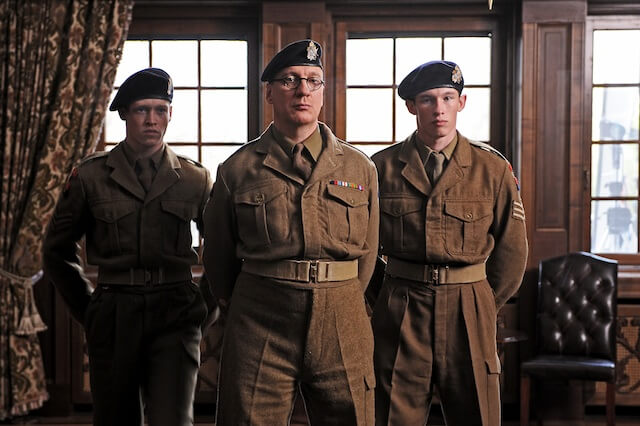‘Queen and Country’ No one but John Boorman could have made 1987’s “Hope and Glory,” and not only because it was loosely culled from his own memories. It’s an unusual WWII saga made by an eccentric filmmaker. A child’s-eye view of the London home front, it’s largely untroubled by trauma; bombings mean misery and displacement but also, for kids, new play spaces, all of this adding up to a romp astride death that’s both unsentimental and disarmingly fun. Even returning to a nearby well would prove tricky for anyone. For what it’s worth, Boorman’s “Queen and Country,” made 27 years later but set only nine years after, isn’t a repeat, but it’s close enough. It has a similar but different lack of pomp, viewing life during a more low-key skirmish — the Korean War — with an eye for drudgery and time-killing antics. In fact, “Queen and Country” might make a better double feature not with “Hope and Glory” but with the Israeli “Zero Motivation,” which also features reluctant cadets fighting mostly to stave off boredom. Callum Turner picks up the role of the young Boorman stand-in, Bill, who’s grown into a slightly mischievous upstart. Upon being conscripted into two years in the service, he spends most of his time trying to elude, or quietly sabotage, his superiors, notably humorless, rule-strickler career militarist Bradley (David Thewlis). He also chases girls, including a mysteriously ailing beauty (Tamsin Egerton). She won’t even tell him her name, so he calls her, semi-affectionately, Ophelia. There’s more plot —and, semi-distressingly, melodrama —here than in the strictly episodic and miraculously always amusing “Hope and Glory,” and Boorman’s digital images don’t have anything approaching the presence of that film’s brown grunge. (One of the oddest visualists in the mainstream, Boorman has had to settle for Plain Jane looks in his latter years.) But this still isn’t in the same ballpark as a self-important war saga. The levity of humor is always around the corner, as are specific bits that could only have been acquired by living through it. (A scene of soldiers gagging on the spiciest curry —so as, a superior crows, to prepare the stomach for the grimy food one eats amidst battle —is a throwaway delight.) Even the more serious threads have a way of petering out without appropriate closure. That’s not a knock: this is a presentation of life as is. Art allows second chances for missed opportunities; when a filmmaker goes out of the way to deny that, as Boorman does here, it’s more gutting than mere pluck of the heartstrings. Meanwhile, subplots that seemed lighter curdle into something more serious, as in a prank involving stealing an old clock. That’s an idea that runs through Boorman’s work: how what seems like a joke blossoms, absurdly, into something dangerous. It’s a sick joke that fueled his underrated John La Carre take “The Tailor of Panama,” and it gets another play here, albeit with less intense consequences. Boorman’s not as in control here as he was in “Hope and Glory,” where every single episode was tight, assured and entertaining. Its plucky nature was a commentary on how war films tend to squash the lifeforce of those who live through it. With nothing approaching the intensity of Blitzkriegs, Boorman digs a little deeper into his protagonist’s head than he usually does. But he still keeps his distance and his cool, and what emerges is a film that’s not as engaging as “Hope and Glory” but more deceptive in its modesty. Indeed, Bill will probably be less haunted by a girl who gets away as he is by the abuse he helped heap upon Thewlis’ superior, who starts off as a monster, turns pathetic and ultimately turns tragic — a man who tried to shut himself off from the world by hiding inside the military. “Queen and Country” works like that: It makes you think it’s about one thing while it quietly busies itself with other matters. By its perfectly judged final shot, a modest remembrance piece has swollen into something quietly and eccentrically profound.
Director: John Boorman
Stars: Callum Turner, Caleb Landry Jones
Rating: NR
4 (out of 5) Globes
Review: ‘Queen and Country’ is a worthy follow-up to ‘Hope and Glory’

BBC Worldwide North America
Follow Matt Prigge on Twitter @mattprigge


















